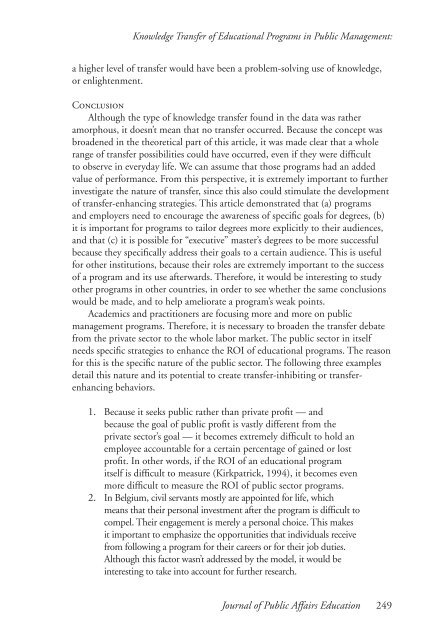JOURNAL OF PUBLIC AFFAIRS EDUCATION - Naspaa
JOURNAL OF PUBLIC AFFAIRS EDUCATION - Naspaa
JOURNAL OF PUBLIC AFFAIRS EDUCATION - Naspaa
You also want an ePaper? Increase the reach of your titles
YUMPU automatically turns print PDFs into web optimized ePapers that Google loves.
Knowledge Transfer of Educational Programs in Public Management:a higher level of transfer would have been a problem-solving use of knowledge,or enlightenment.ConclusionAlthough the type of knowledge transfer found in the data was ratheramorphous, it doesn’t mean that no transfer occurred. Because the concept wasbroadened in the theoretical part of this article, it was made clear that a wholerange of transfer possibilities could have occurred, even if they were difficultto observe in everyday life. We can assume that those programs had an addedvalue of performance. From this perspective, it is extremely important to furtherinvestigate the nature of transfer, since this also could stimulate the developmentof transfer-enhancing strategies. This article demonstrated that (a) programsand employers need to encourage the awareness of specific goals for degrees, (b)it is important for programs to tailor degrees more explicitly to their audiences,and that (c) it is possible for “executive” master’s degrees to be more successfulbecause they specifically address their goals to a certain audience. This is usefulfor other institutions, because their roles are extremely important to the successof a program and its use afterwards. Therefore, it would be interesting to studyother programs in other countries, in order to see whether the same conclusionswould be made, and to help ameliorate a program’s weak points.Academics and practitioners are focusing more and more on publicmanagement programs. Therefore, it is necessary to broaden the transfer debatefrom the private sector to the whole labor market. The public sector in itselfneeds specific strategies to enhance the ROI of educational programs. The reasonfor this is the specific nature of the public sector. The following three examplesdetail this nature and its potential to create transfer-inhibiting or transferenhancingbehaviors.1. Because it seeks public rather than private profit — andbecause the goal of public profit is vastly different from theprivate sector’s goal — it becomes extremely difficult to hold anemployee accountable for a certain percentage of gained or lostprofit. In other words, if the ROI of an educational programitself is difficult to measure (Kirkpatrick, 1994), it becomes evenmore difficult to measure the ROI of public sector programs.2. In Belgium, civil servants mostly are appointed for life, whichmeans that their personal investment after the program is difficult tocompel. Their engagement is merely a personal choice. This makesit important to emphasize the opportunities that individuals receivefrom following a program for their careers or for their job duties.Although this factor wasn’t addressed by the model, it would beinteresting to take into account for further research.Journal of Public Affairs Education 249
















